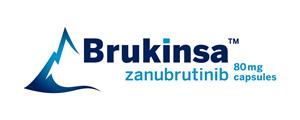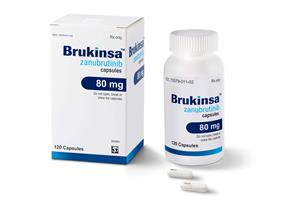U.S. FDA Grants BeiGene’s BRUKINSA™ (zanubrutinib) Accelerated Approval to Treat Adult Patients with Mantle Cell Lymphoma Who Received at Least One Prior Therapy
Nov 14, 2019 4:20 PM
- This marks the first FDA approval for
|
||||||||||
- 84% of patients taking BRUKINSA achieved an overall response1
- BRUKINSA is the only FDA-approved BTK inhibitor shown to deliver 100% median occupancy in peripheral blood cells and the only BTK inhibitor with the flexibility to be taken once or twice daily
This accelerated approval is based on overall response rate (ORR). Continued approval for this indication may be contingent upon verification and description of clinical benefit in a confirmatory trial.
“We are working to improve outcomes for people with cancer worldwide and this approval brings us closer to realizing our mission of bringing the highest quality therapies to patients globally,” said
“BRUKINSA is a BTK inhibitor that was designed to maximize target occupancy and minimize off-target binding. It entered the clinic in 2014 and since that time our broad development program has enrolled more than 1,600 patients globally,” said
“BTK inhibition is an established mode of treatment for patients with MCL, but many patients treated with previously approved BTK inhibitors do not fully respond to BTK therapy or are forced to discontinue treatment early due to side effects. Today we have a new option for our adult patients who have received one prior systemic or targeted therapy and are living with MCL, an aggressive blood cancer that’s often diagnosed at a more advanced stage,” said
“The approval of BRUKINSA as a second line therapy represents an important advancement for the treatment of mantle cell lymphoma,” said
The FDA’s approval of BRUKINSA is based on efficacy results from two single-arm clinical trials, with independent review committee (IRC)-assessed ORR per 2014 Lugano Classification as the primary endpoint. Across both trials, BRUKINSA achieved an ORR, which is the sum of complete responses and partial responses, of 84%.
In the multicenter Phase 2 trial of zanubrutinib in patients with relapsed or refractory (R/R) MCL BGB-3111-206 (NCT03206970), the ORR was 84% (95% CI: 74%, 91%), including 59% complete response (FDG-PET scan required) and 24% partial response. In this study, the median duration of response (DOR) was 19.5 months (95%CI: 16.6, NE) and median follow-up time on study was 18.4 months. In the global Phase 1/2 trial BGB-3111-AU-003 (NCT02343120), the ORR was 84% (95% CI: 67%, 95%), including 22% complete response (FDG-PET scan not required) and 62% partial response. In this study, the median DOR was 18.5 months1 (95% CI:12.6, NE) and median follow-up time on study was 18.8 months.
The most common adverse reactions (> 10%) with BRUKINSA were decreased neutrophil count, decreased platelet count, upper respiratory tract infection, decreased white blood cell count, decreased hemoglobin, rash, bruising, diarrhea, cough, musculoskeletal pain, pneumonia, urinary tract infection, blood in the urine (hematuria), fatigue, constipation, and hemorrhage. The most frequent serious adverse reactions were pneumonia (11%) and hemorrhage (5%).
Of the 118 patients with MCL treated with BRUKINSA, eight (7%) patients discontinued treatment due to adverse reactions in the trials. The most frequent adverse reaction leading to treatment discontinuation was pneumonia (3.4%). One (0.8%) patient experienced an adverse reaction leading to dose reduction (hepatitis B).
The recommended dose of BRUKINSA is 320 mg, taken orally 160 mg twice daily or 320 mg once daily with or without food. The dose may be adjusted for adverse reactions, and reduced for patients with severe hepatic impairment and certain drug interactions.1
BRUKINSA is expected to be available to people in
myBeiGene™ Patient Support Program
About Mantle Cell Lymphoma (MCL)
Lymphoma is a diverse group of cancers that originate from B-, T- or NK- cells. MCL is typically an aggressive form of non-Hodgkin’s lymphoma (NHL) that arises from B-cells originating in the “mantle zone.”2 In the
About BRUKINSA (zanubrutinib)
BRUKINSA is a small molecule inhibitor of Bruton’s tyrosine kinase (BTK), discovered by
New Drug Applications (NDAs) in
BRUKINSA is not approved for use outside
IMPORTANT SAFETY INFORMATION FOR BRUKINSA (ZANUBRUTINIB)
Warnings and Precautions
Hemorrhage
Fatal and serious hemorrhagic events have occurred in patients with hematological malignancies treated with BRUKINSA monotherapy. Grade 3 or higher bleeding events including intracranial and gastrointestinal hemorrhage, hematuria and hemothorax have been reported in 2% of patients treated with BRUKINSA monotherapy. Bleeding events of any grade, including purpura and petechiae, occurred in 50% of patients treated with BRUKINSA monotherapy.
Bleeding events have occurred in patients with and without concomitant antiplatelet or anticoagulation therapy. Co-administration of BRUKINSA with antiplatelet or anticoagulant medications may further increase the risk of hemorrhage.
Monitor for signs and symptoms of bleeding. Discontinue BRUKINSA if intracranial hemorrhage of any grade occurs. Consider the benefit-risk of withholding BRUKINSA for 3-7 days pre- and post-surgery depending upon the type of surgery and the risk of bleeding.
Infections
Fatal and serious infections (including bacterial, viral, or fungal) and opportunistic infections have occurred in patients with hematological malignancies treated with BRUKINSA monotherapy. Grade 3 or higher infections occurred in 23% of patients treated with BRUKINSA monotherapy. The most common Grade 3 or higher infection was pneumonia. Infections due to hepatitis B virus (HBV) reactivation have occurred.
Consider prophylaxis for herpes simplex virus, pneumocystis jiroveci pneumonia and other infections according to standard of care in patients who are at increased risk for infections. Monitor and evaluate patients for fever or other signs and symptoms of infection and treat appropriately.
Cytopenias
Grade 3 or 4 cytopenias, including neutropenia (27%), thrombocytopenia (10%) and anemia (8%) based on laboratory measurements, were reported in patients treated with BRUKINSA monotherapy.
Monitor complete blood counts during treatment and treat using growth factor or transfusions, as needed.
Second Primary Malignancies
Second primary malignancies, including non-skin carcinoma, have occurred in 9% of patients treated with BRUKINSA monotherapy. The most frequent second primary malignancy was skin cancer (basal cell carcinoma and squamous cell carcinoma of skin), reported in 6% of patients. Advise patients to use sun protection.
Cardiac Arrhythmias
Atrial fibrillation and atrial flutter have occurred in 2% of patients treated with BRUKINSA monotherapy. Patients with cardiac risk factors, hypertension, and acute infections may be at increased risk. Grade 3 or higher events were reported in 0.6% of patients treated with BRUKINSA monotherapy. Monitor signs and symptoms for atrial fibrillation and atrial flutter and manage as appropriate.
Embryo-Fetal Toxicity
Based on findings in animals, BRUKINSA can cause fetal harm when administered to a pregnant woman. Administration of zanubrutinib to pregnant rats during the period of organogenesis caused embryo-fetal toxicity, including malformations at exposures that were 5 times higher than those reported in patients at the recommended dose of 160 mg twice daily. Advise women to avoid becoming pregnant while taking BRUKINSA and for at least 1 week after the last dose. Advise men to avoid fathering a child during treatment and for at least 1 week after the last dose. If this drug is used during pregnancy, or if the patient becomes pregnant while taking this drug, the patient should be apprised of the potential hazard to a fetus.
Adverse Reactions
The most common adverse reactions in > 10% of patients who received BRUKINSA were neutrophil count decreased (53%), platelet count decreased (39%), upper respiratory tract infection (38%), white blood cell count decreased (30%), hemoglobin decreased (29%), rash (25%), bruising (23%), diarrhea (20%), cough (20%), musculoskeletal pain (19%), pneumonia (18%), urinary tract infection (13%), hematuria (12%), fatigue (11%), constipation (11%), and hemorrhage (10%). The most frequent serious adverse reactions were pneumonia (11%) and hemorrhage (5%).
Drug Interactions
CYP3A Inhibitors: When BRUKINSA is co-administered with a strong CYP3A inhibitor, reduce BRUKINSA dose to 80 mg once daily. For coadministration with a moderate CYP3A inhibitor, reduce BRUKINSA dose to 80 mg twice daily.
CYP3A Inducers: Avoid coadministration with moderate or strong CYP3A inducers.
Specific Populations
Hepatic Impairment: The recommended dose of BRUKINSA for patients with severe hepatic impairment is 80 mg orally twice daily.
INDICATION
BRUKINSA is a kinase inhibitor indicated for the treatment of adult patients with mantle cell lymphoma (MCL) who have received at least one prior therapy.
This indication is approved under accelerated approval based on overall response rate. Continued approval for this indication may be contingent upon verification and description of clinical benefit in a confirmatory trial.
Please see full Prescribing Information at beigene.com/PDF/BRUKINSAUSPI.pdf and Patient Information at beigene.com/PDF/BRUKINSAUSPPI.pdf
About the Zanubrutinib Clinical Trial Program
Clinical trials of zanubrutinib include:
- Fully-enrolled Phase 3 ASPEN clinical trial in patients with Waldenström macroglobulinemia (WM) comparing zanubrutinib to ibrutinib (NCT03053440), currently the only approved BTK inhibitor for WM;
- Phase 3 SEQUOIA trial comparing zanubrutinib with bendamustine plus rituximab in patients with treatment-naive (TN) chronic lymphocytic leukemia (CLL) or small lymphocytic lymphoma (SLL) (NCT03336333);
- Phase 3 ALPINE trial comparing zanubrutinib to ibrutinib in patients with relapsed/refractory (R/R) CLL/SLL (NCT03734016);
- Phase 2 trial in combination with GAZYVA® (obinutuzumab) in patients with R/R follicular lymphoma (FL) (NCT03332017);
- Phase 3 trial comparing zanubrutinib and rituximab to bendamustine and rituximab in patients with untreated MCL (NCT04002297);
- Phase 2 MAGNOLIA trial in patients with R/R marginal zone lymphoma (MZL) (NCT03846427);
- Phase 2 ROSEWOOD trial (NCT03332017) in
China comparing obinutuzumab and zanubrutinib vs obinutuzumab alone in treating patients with R/R FL; - Completed Phase 2 trials in patients with R/R MCL (NCT03206970) and R/R CLL/SLL (NCT03206918); and
- Completed enrollment in Phase 2 clinical trial in patients with WM (NCT03332173).
About
Forward-Looking Statements
This press release contains forward-looking statements within the meaning of the Private Securities Litigation Reform Act of 1995 and other federal securities laws, including statements regarding BeiGene’s plans and expectations for the commercialization of BRUKINSA, the potential implications of clinical data for patients, BeiGene’s further advancement of, and anticipated clinical development, regulatory milestones and commercialization of BRUKINSA. Actual results may differ materially from those indicated in the forward-looking statements as a result of various important factors, including
Investor Contact
+1 857-302-5189
Media Contact
+1 857-302-5663 or +1 857-302-7596
_________________________________________
1 BRUKINSA (zanubrutinib) Prescribing Information. beigene.com/PDF/BRUKINSAUSPI.pdf.
2 https://www.lls.org/sites/default/files/file_assets/FS4_MCL_Facts_2018-final.pdf
3 https://www.cancer.org/cancer/non-hodgkin-lymphoma/about/key-statistics.html
4 Philip J. Bierman, James
5 ABRAXANE®, REVLIMID® and VIDAZA® are registered trademarks of Celgene Corporation.
Photos accompanying this announcement are available at:
https://www.globenewswire.com/NewsRoom/AttachmentNg/f728ceea-0c2b-4042-a937-e6b1638b4323
https://www.globenewswire.com/NewsRoom/AttachmentNg/5e5fe145-2754-4389-b9b9-b23a3731d03e
PDFs accompanying this announcement are available at:
http://ml.globenewswire.com/Resource/Download/aca04555-626d-4c35-821b-957abaab640c
http://ml.globenewswire.com/Resource/Download/c47ea153-ba25-4dd1-8155-937b64fdf4b7
Source:

